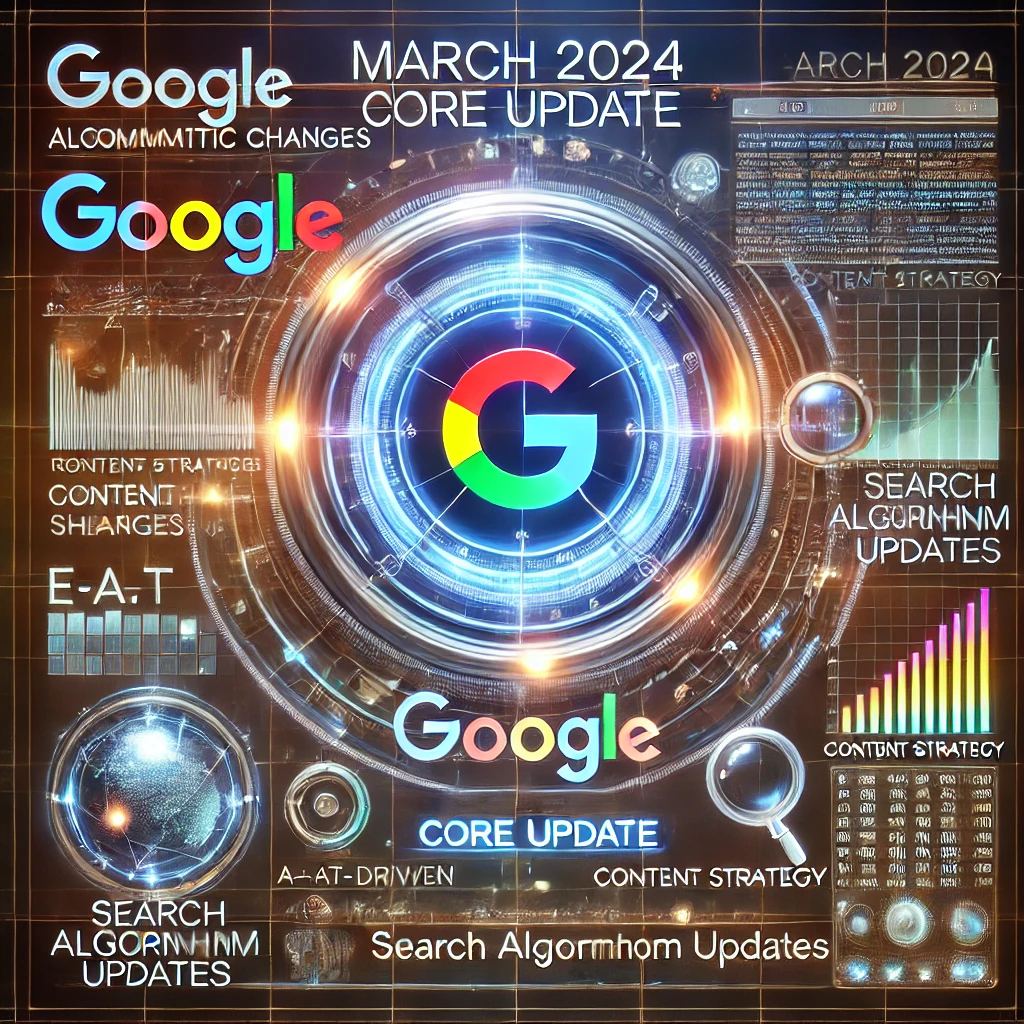
Introduction
The digital landscape is in a state of perpetual evolution, and with each Google Core Update, the rules of the game shift once again. The March 2024 Core Update has sent shockwaves through the SEO world, bringing significant adjustments to SEO ranking factors, redefining content relevance, and emphasizing user intent like never before. Webmasters, content creators, and SEO professionals are now scrambling to decode the impact and align their strategies with the new search reality.
This update underscores Google’s ongoing commitment to refining search quality, further strengthening the importance of E-A-T (Expertise, Authority, Trustworthiness), and reducing reliance on outdated ranking tactics. But what does it truly mean for the future of search visibility, and how should businesses adjust their content strategy to stay ahead?
Understanding Google’s March 2024 Core Update
Google’s algorithm updates are designed to enhance search accuracy, prioritizing useful, authoritative, and user-centric content. The March 2024 Core Update follows a familiar yet increasingly stringent pattern of favoring genuinely helpful content over keyword-stuffed, low-value pages.
Key areas affected include:
- Quality Signals: Websites with outdated, thin, or misleading content have seen major drops in rankings.
- User Engagement Metrics: Bounce rate, dwell time, and interaction rates are now more crucial in assessing a page’s relevance.
- Link Relevancy Over Quantity: The focus has shifted from sheer backlink volume to the contextual value of inbound and outbound links.
- AI-Generated Content Scrutiny: Auto-generated content, especially when lacking originality or human oversight, faces significant devaluation.
To thrive under these changes, businesses must prioritize content authenticity, comprehensive topic coverage, and seamless user experience.
How SEO Ranking Factors Have Shifted
The Google Core Update has refined how websites are assessed and ranked, reshaping the importance of various SEO ranking factors. While foundational elements like backlinks, keywords, and metadata remain relevant, the weight assigned to certain factors has changed.
1. Content Depth and Authority
Thin, surface-level content is no longer enough. Google’s algorithm favors in-depth, authoritative, and well-researched content that provides real value to users. The best-performing pages tend to:
- Cover topics comprehensively.
- Cite authoritative sources.
- Offer unique insights or expert opinions.
2. Search Intent Optimization
Understanding what users are truly looking for has become paramount. Pages that directly address searcher needs with clarity and precision will outperform those that focus solely on keyword density.
3. Mobile-First Indexing & Page Experience
Google continues to emphasize mobile-friendliness and site speed. Sites with slow loading times, intrusive pop-ups, or poor navigation structures have been negatively impacted.
4. Topical Authority and Semantic Search
Google’s increasing use of AI-driven ranking mechanisms means that topical clusters and entity-based content strategies now outperform isolated keyword-targeting methods.
The Role of the Helpful Content Update

One of the major pillars of the March 2024 Core Update is an extension of the Helpful Content Update that Google initially introduced in previous years. This initiative prioritizes content that genuinely assists users in finding answers, making informed decisions, or solving problems.
Key Takeaways from the Helpful Content Update:
- AI-generated, low-effort articles created purely for ranking purposes are being heavily penalized.
- Pages that repeat general knowledge without adding new insights are losing traction.
- Content that aligns with search intent and delivers clear, actionable value is ranking higher.
For websites, this means an even stronger focus on original, experience-based, and user-focused material. First-hand expertise and deep industry knowledge are now invaluable assets in content creation.
E-A-T (Expertise, Authority, Trustworthiness) Remains Crucial
Google has continued to refine its assessment of E-A-T (Expertise, Authority, Trustworthiness), making it a non-negotiable standard for websites aiming to rank well. In the wake of rampant misinformation and AI-generated spam, Google is relying more on signals that indicate credibility.
How to Strengthen E-A-T Signals:
- Showcase Expertise: Feature content written or reviewed by qualified professionals.
- Cite Reputable Sources: Link to authoritative sites and studies.
- Strengthen Brand Presence: A well-established online presence with consistent branding and reputable backlinks enhances perceived authority.
- User Engagement and Reviews: Positive engagement metrics and authentic customer feedback signal trustworthiness.
Search Algorithm Changes: What’s Different?
Every Google Core Update brings adjustments to how pages are ranked, and the March 2024 Core Update is no exception. The most noticeable search algorithm changes include:
- More Sophisticated Natural Language Processing (NLP): Google’s AI understands context better than ever, reducing keyword dependency.
- Greater Emphasis on Multimedia Content: Pages incorporating rich media (images, videos, infographics) are favored for enhanced user engagement.
- Increased Sensitivity to Link Relevance: Low-quality link-building strategies are being devalued more aggressively.
- User Experience as a Ranking Factor: Poorly structured content with excessive ads or distractions is suffering declines.
Keyword Optimization in the New SEO Era
While keyword research remains a cornerstone of SEO, the way it’s applied is evolving. Traditional methods of keyword optimization—such as exact-match targeting—are becoming less effective, giving way to semantic search and entity-based content strategies.
Best Practices for 2024:
- Focus on topic relevance over keyword frequency.
- Use natural language and contextually rich content.
- Leverage structured data and schema markup for better clarity.
- Align keywords with conversational search patterns (e.g., voice search queries).
By incorporating these strategies, websites can adapt to the modern search landscape while maintaining strong visibility.
Organic Traffic Impact: Winners and Losers
The organic traffic impact of the March 2024 Core Update has been substantial, with some industries experiencing dramatic shifts.
Industries That Have Benefited:
✔️ Educational and authoritative websites with detailed guides and research-backed content. ✔️ Niche industry experts who provide firsthand knowledge and experience-based insights. ✔️ Websites optimizing for conversational and voice search queries.
Industries That Have Struggled:
❌ Thin affiliate sites relying on generic product roundups without unique analysis. ❌ AI-generated blogs with little human oversight or added value. ❌ News aggregators republishing existing content without original contributions.
For businesses and content creators, this means a necessary shift toward authenticity, value-driven content, and enhanced user experiences to maintain or recover rankings.
Final Thoughts: Adapting to the New SEO Landscape
The March 2024 Core Update has reinforced Google’s ongoing mission to prioritize valuable, user-centric content while penalizing manipulative SEO tactics. The days of gaming the system with shortcuts are long gone. Instead, success now hinges on content authenticity, deep expertise, and a genuine commitment to serving the searcher’s intent.
As search evolves, so must SEO strategies. Prioritizing E-A-T, embracing helpful content updates, and understanding search algorithm changes will be crucial for maintaining visibility. Businesses that align with these evolving SEO ranking factors will not only survive but thrive in the ever-changing digital ecosystem.




